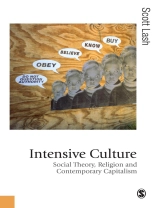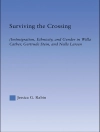Contemporary culture, today′s capitalism – our global information society – is ever expanding, is ever more
extensive. And yet we seem to be experiencing a parallel phenomenon which can only be characterised as
intensive. This thought provoking, innovative book is dedicated to the study of such intensive culture. Whilst extensive culture is a culture of the same: a culture of fixed
equivalence; intensive culture is a culture of
difference, of
in-equivalence – the singular. Intensities generate what we encounter. They are virtuals or possibilities, always in process and always in movement.
We thus live in a culture that is both extensive and intensive. Indeed the more globally stretched and extensive social relations become the more they simultaneously seem to take on this intensity. Ours is a relational world where each intensity ? whether human, technological or biological ? provides a distinct, specific window onto the whole.
Lash tracks the emergence and pervasion of this intensive culture in society, religion, philosophy, language, communications, politics and the neo-liberal economy itself.
In so doing he redefines the work of Leibniz, Benjamin, Simmel, and Durkheim and inititates the reader into the ontological structures of our contemporary social relations. In the pursuit of intensive culture the reader is taken on an excursion from Karl Marx′s Capital to the ′information theology′ in the science fiction of Philip K. Dick.
Diverse, engaging and rich in detail the resulting book will be of interest to all those studying social and cultural theory, sociology, media and communication and cultural studies
Зміст
Introduction
Culture: Extensive and Intensive
What is Intensive Culture?
Ontology and Religion
Overview
Social Theory
Intensive Sociology: Georg Simmel′s Vitalism
Forms: From Cognitive a priori to Social a priori
Value: Nietzsche and Simmel
Social substance: from Labour to Life
Monadology: Simmel, Bergson, Metaphysics
Conclusions: Towards a Global Politics of Flux
Intensive Philosophy: Leibniz and the Ontology of Difference
Leibniz, Aristotle, Ontology
Sensation, Perception, Knowledge
Intensive Causation
Language: Intrinsic Predication
Substance and System: From Exchange of Equivalents to Exchange of Difference
Intensive Language: Benjamin, God and the Name
Leibniz and Benjamin: From the Monad to the Word
Intensive Method: From Epistemology to Truth
Language: Things, Man and God
Intensive Capitalism: Marxist Ontology
Introduction: From Commodity to Difference
Causation and value: Aristotle and Marx
Externalities: Intensive Capitalism and Neo-Liberalism
Financialization
The Intensive-material: Machines of Predication
Intensive Politics: Power after Hegemony
Language: Power becomes Ontological
Two Types of Power
From Norm to Fact
From Representation to Communication
Cultural Studies: First and Second Wave
Intensive Religion: Emile Durkheim′s Elementary Forms
The Soul: From Rite and Totem to Myth and Ancestor
The Totem: Clan and Emblem
Alimentary Communion
Totemic Vitalism: Durkheim and Freud
Extensive Religion:
Sociological Categories
The Social Fact: Metaphysical Things
Information Theology: Philip K. Dick′s Will to Knowledge
Transmigration
(a) Faith versus knowledge
(b) Dick′s St. Paul: Against Law and the Messianic
(c) Christ′s mushroom: Salvation by Eating
(d) Vast Active Living Intelligence System
The Gnosticism of Philip K. Dick
Horselover Fat: Healing the Subject
Valis: The Movie
Conclusions
Intensity: Ontology and Religion
Intensity′s Outside: Chinese Social Theory?
Про автора
Professor Scott Lash is the Director of the Centre for Cultural Studies at Goldsmiths College, as well as a a project leader in the Goldsmiths Media Research Programme. He is a leading name within sociology and cultural studies, has written numerous books and articles over the last twenty years, and is currently the managing editor for the journal Theory, Culture and Society.












